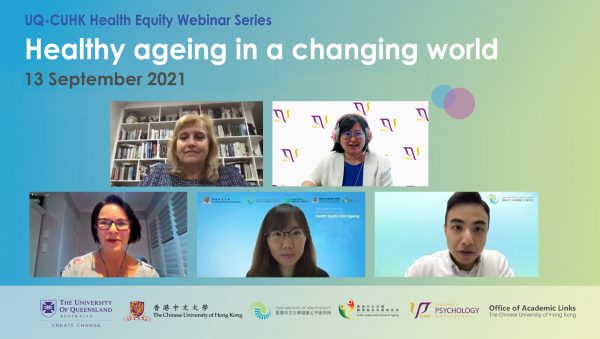
Harnessing collective knowledge to promote healthy ageing

Joint webinar with UQ explores issues surrounding healthy ageing.
CUHK and the University of Queensland (UQ) have been partners since 2002 and share a common vision in achieving excellence in research and creating impact locally and globally. As regional leaders, the two universities are organising a series of webinars on health equity in the coming months to generate dialogues in this topic of global significance.
The first webinar on ‘Healthy Ageing in a Changing World’ was held on 13 September, featuring Prof. Laurie Buys and Prof. Nancy Pachana of the Faculty of Health and Behavioural Sciences at UQ, and Prof. Helene Fung and Dr. Ruby Yu of the CUHK Jockey Club Institute of Ageing and Prof. Eric Lai of the CUHK Institute of Health Equity. The webinar attracted 130 participants from around the world.
The speakers shared their research and explored different perspectives of the topic in the context of social determinants, including motivation and emotion, indigenous health, intrinsic capacity (IC), and the relevance of academic research and government policies in addressing the needs of the elderly.
Prof. Fung conveyed that the cognitive ability of older adults can be improved by increasing their motivation. Prof. Buys reflected on the goals of healthy ageing research. ‘Researchers and practitioners are interested in health and medical in ageing, but people are talking about finances, housing, community networks and employment. We need to make sure there is a connection or translation of our research.’ She also believes that ageing should be embraced as an opportunity for better planning in areas such as policy, system and infrastructure in order to create an age-inclusive society.
The composite score of all the physical and mental capacities of an individual, IC, is a good means to measure one’s health status, according to Dr. Yu. ‘From an individual perspective, assessment of IC can motivate people to make healthier changes earlier in their life. From a policy perspective, IC could be used to forecast the needs of older people. We should develop multi-domain interventions which would help reduce the risk of frailty and functional limitations.’
Prof. Pachana highlighted that UQ is the first Age Friendly University in the Southern Hemisphere. In light of the fact that 2021–2030 has been declared as the ‘Decade of Healthy Ageing’ by the United Nations, this is an excellent time to think innovatively about how social science and research can help support healthy ageing.